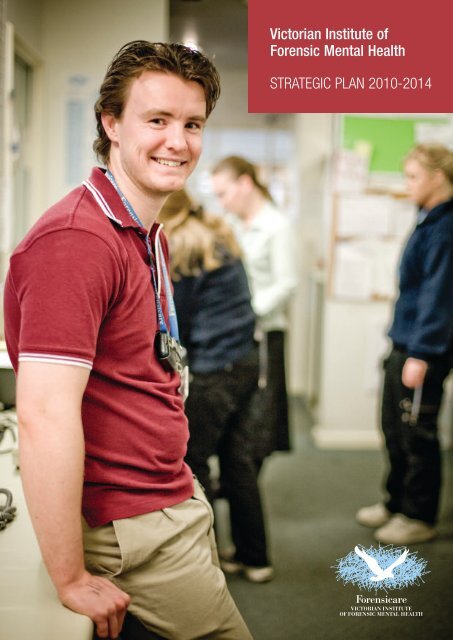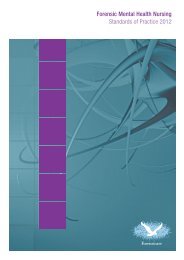Strategic Plan 2010-2014 - Forensicare
Strategic Plan 2010-2014 - Forensicare
Strategic Plan 2010-2014 - Forensicare
Create successful ePaper yourself
Turn your PDF publications into a flip-book with our unique Google optimized e-Paper software.
Victorian Institute of<br />
Forensic Mental Health<br />
STRATEGIC PLAN <strong>2010</strong>-<strong>2014</strong>
OUR VISION<br />
To provide leadership at an<br />
international, national and local<br />
level in the understanding and<br />
treatment of mental disorders<br />
associated with criminal<br />
behaviour.<br />
STATEMENT OF PURPOSE<br />
We provide high quality<br />
assessment and treatment for<br />
people with a mental disorder<br />
and a history of criminal<br />
offending or who present a<br />
serious risk of offending<br />
behaviour. In doing so, we are<br />
an effective link for people,<br />
organisations and government<br />
between the justice and mental<br />
health sectors.<br />
Victorian Institute of Forensic Mental Health<br />
Yarra Bend Road<br />
Fairfield 3078<br />
Tel 61 3 9495 9100<br />
Fax 61 3 9495 9190<br />
info@forensicare.vic.gov.au<br />
www.forensicare.vic.gov.au<br />
ABN 32 807 323 885<br />
ISSN 1834-2930<br />
<strong>Strategic</strong> <strong>Plan</strong> <strong>2010</strong>-<strong>2014</strong>
INTRODUCTION<br />
The Hon. Allan McDonald, QC<br />
Chair,<br />
Victorian Institute of Forensic Mental Health<br />
Council<br />
Tom Dalton<br />
Chief Executive Officer<br />
When <strong>Forensicare</strong> was created through<br />
legislation in 1997 it provided a new<br />
platform for the delivery of forensic<br />
mental health services in the state of<br />
Victoria. In the 12 years that <strong>Forensicare</strong><br />
has been delivering services, we have<br />
built on the original vision and service<br />
delivery platform to develop into a mature<br />
organisation that is known worldwide for<br />
the quality of its services. We operate as<br />
a vital link between the public mental<br />
health and criminal justice systems to<br />
respond to a vulnerable client group and<br />
play an important role in community<br />
safety in the state of Victoria.<br />
It is important that <strong>Forensicare</strong> continues<br />
to respond to the needs of the community<br />
and our stakeholders. The <strong>Strategic</strong> <strong>Plan</strong><br />
<strong>2010</strong> - <strong>2014</strong> provides the framework for<br />
the coming five years for how we respond<br />
to our internal and external environment.<br />
<strong>Forensicare</strong>’s Council commenced the<br />
work to develop the <strong>Strategic</strong> <strong>Plan</strong> in<br />
2009. Comprehensive consultations took<br />
place with 19 internal staff groups and a<br />
wide range of 33 external stakeholder<br />
groups. Through the course of these<br />
consultations we gained valuable<br />
feedback on our stakeholders’<br />
perceptions of need, and those areas in<br />
which we could improve our performance.<br />
During this time, the fourth National<br />
Mental Health <strong>Plan</strong> was released and the<br />
Victorian State Government released<br />
Because Mental Health Matters – a 10<br />
year policy framework for the delivery<br />
of mental health services. Both these<br />
documents provide strategic direction<br />
and, significantly, for the first time,<br />
recognised the particular needs of<br />
<strong>Forensicare</strong>’s patient and client group.<br />
The wide ranging consultations that were<br />
undertaken, and the framework of the<br />
state and national plans, form the<br />
foundation of this <strong>Strategic</strong> <strong>Plan</strong>.<br />
The objectives that we have set under the<br />
plan, and the initiatives we have identified<br />
under each of these objectives, give voice<br />
to the needs and challenges identified by<br />
our patients, clients, staff and stakeholders,<br />
and the changes that are currently<br />
occurring within our environment. In<br />
publishing our <strong>Strategic</strong> <strong>Plan</strong> and the<br />
initiatives we have identified for the first<br />
year, Council and the Executive of<br />
<strong>Forensicare</strong> acknowledge that we must<br />
be publicly accountable for achieving<br />
the objectives and goals we have set<br />
ourselves. To do this, we will continue<br />
to report regularly to the Minister for<br />
Mental Health on our performance and<br />
achievements. We will also establish new<br />
ways of communicating with our staff<br />
and stakeholders so that people are kept<br />
informed of our progress and initiatives.<br />
The coming year will see significant<br />
change in how we operate, as we<br />
continue to build on the solid foundations<br />
of the past 12 years to continually<br />
improve our organisation.<br />
We would like to express our appreciation<br />
for the time and input of our consumers,<br />
staff and stakeholders in the development<br />
of this plan. We look forward to working<br />
with you all to achieve our new vision<br />
and mission and the initiatives we have<br />
identified for the coming year.<br />
Tom Dalton<br />
Chief Executive Officer<br />
Allan William McDonald, QC<br />
Chair,<br />
Victorian Institute of Forensic Mental<br />
Health Council<br />
July <strong>2010</strong><br />
<strong>Strategic</strong> <strong>Plan</strong> <strong>2010</strong>-<strong>2014</strong><br />
1
OUR BACKGROUND<br />
The Victorian Institute of Forensic Mental<br />
Health, known as <strong>Forensicare</strong>, is a<br />
statutory agency that was established in<br />
1997 to provide adult forensic mental<br />
health services in Victoria. <strong>Forensicare</strong> is<br />
mandated through the Mental Health Act<br />
1986 to provide inpatient and community<br />
specialist clinical services, and engage in<br />
research, training and professional<br />
education.<br />
<strong>Forensicare</strong> is governed by a 10 member<br />
Council that is accountable to the Minister<br />
for Mental Health. The Council is<br />
responsible for the overall governance<br />
of the Institute, including the strategic<br />
direction and monitoring of performance.<br />
Council members are appointed for three<br />
year periods and include a nominee of<br />
both the Attorney-General and the<br />
Minister for Corrections.<br />
<strong>Forensicare</strong>’s mandate to provide<br />
research and education is pursued<br />
through its affiliation with Monash<br />
University and the Centre for Forensic<br />
Behavioural Science. Its research findings<br />
are communicated widely, and influence<br />
both practice and policy development<br />
across the mental health and criminal<br />
justice sectors.<br />
In <strong>2010</strong> <strong>Forensicare</strong> celebrates the<br />
10 year anniversary of the opening of<br />
Thomas Embling Hospital. Since the<br />
organisation began, demand for services<br />
has increased markedly, particularly for<br />
inpatient care at Thomas Embling<br />
Hospital. Changes which pose fresh<br />
challenges and offer new opportunities<br />
are imminent, and it is against this<br />
background that we commenced the<br />
process of updating our strategic<br />
directions to meet these developments.<br />
OUR VALUES<br />
<strong>Forensicare</strong> is guided by the values<br />
established by the State Services<br />
Authority for the public sector, and<br />
promotes behaviours that are consistent<br />
with these values at all times and in all<br />
circumstances.<br />
Our values are –<br />
Responsiveness<br />
Integrity<br />
Impartiality<br />
Accountability<br />
Respect<br />
Leadership<br />
Human rights<br />
OUR LEGISLATION<br />
Mental Health Act 1986 – the Act that<br />
establishes the Institute and governs our<br />
responsibilities.<br />
Crimes (Mental Impairment and Unfitness<br />
to be Tried) Act 1997; Corrections Act<br />
1986; Sentencing Act 1991 – these Acts<br />
detail specific services that we provide.<br />
2 <strong>Strategic</strong> <strong>Plan</strong> <strong>2010</strong>-<strong>2014</strong>
OUR SERVICES<br />
<strong>Forensicare</strong> provides specialist statewide<br />
forensic mental health services to meet the<br />
needs of mentally disordered offenders, the<br />
mental health and justice sectors and the<br />
community. These services include the<br />
effective assessment, treatment and<br />
management of forensic patients and<br />
clients. While our primary focus is the<br />
provision of quality clinical services, we<br />
also undertake research and provide<br />
training and professional education.<br />
<strong>Forensicare</strong> is an integral part of the<br />
wider public mental health service<br />
system. We work collaboratively<br />
supporting area mental health services by<br />
providing assessment and treatment to<br />
referred clients, and consultative advice<br />
and training for staff on forensic mental<br />
health issues.<br />
CLINICAL OPERATIONS<br />
Thomas Embling Hospital<br />
<strong>Forensicare</strong>’s inpatient program is<br />
provided at Thomas Embling Hospital<br />
(a secure inpatient facility located in<br />
Fairfield). The Thomas Embling Hospital,<br />
initially developed to provide 100 inpatient<br />
beds, now operates with an interim<br />
capacity of 116 beds providing acute<br />
and continuing care, and a dedicated<br />
women’s unit.<br />
Prison Mental Health Service<br />
<strong>Forensicare</strong> provides the following<br />
forensic mental health services within the<br />
prison system under a contractual<br />
arrangement with the Department of<br />
Justice –<br />
• 16-bed Acute Assessment Unit,<br />
specialist clinics, outpatient services<br />
and a reception assessment program<br />
at Melbourne Assessment Prison<br />
• 20-bed residential program (Marrmak<br />
Unit), intensive outreach program and<br />
therapeutic day program for women at<br />
Dame Phyllis Frost Centre<br />
• consultant psychiatric service to the<br />
larger prisons operated by Corrections<br />
Victoria.<br />
These services were recently subject to a<br />
tender that has since been terminated for<br />
the provision of all health services across<br />
the criminal justice system (see page 4).<br />
Community Forensic Mental Health<br />
Service<br />
The community program focuses on the<br />
assessment and treatment of forensic<br />
patients (people who are subject to a<br />
court order by virtue of mental<br />
impairment) and selected offenders and<br />
potential offenders with a severe mental<br />
illness and significant forensic issues. In<br />
addition, the community program provides<br />
a Problem Behaviour Program for people<br />
with problem behaviours (including sex<br />
offenders) who pose a high risk to the<br />
community, and the Community<br />
Integration Program, which supports<br />
prisoners with a serious mental illness<br />
being released from custody and high risk<br />
clients from area mental health services.<br />
A Court Liaison Service also operates at<br />
Melbourne Magistrates’ Court and six<br />
metropolitan magistrates’ courts.<br />
OPERATIONAL ACTIVITY<br />
The following information gives a<br />
snapshot of <strong>Forensicare</strong>'s service<br />
provision in 2009 to <strong>2010</strong> –<br />
• At 30 June <strong>2010</strong>, <strong>Forensicare</strong><br />
employed 307 clinical and 39<br />
administrative staff, some of whom<br />
were part-time. Of the 346 staff, 62<br />
percent were women, and 38 percent<br />
men.<br />
• There were 125 admissions to<br />
Thomas Embling Hospital and 130<br />
separations, with an average<br />
occupancy rate of 96.1%.<br />
• The Community Forensic Mental<br />
Health Service provided direct services<br />
for 648 new clients.<br />
• A total of 519 reports was prepared<br />
for Victorian courts (283 were<br />
prepared at the Community Forensic<br />
Mental Health Service and 236 within<br />
prison), an average of 10 per week.<br />
• Assessments for public mental health<br />
services and other agencies totalled<br />
168.<br />
• 5,663 reception assessments were<br />
undertaken at Melbourne Assessment<br />
Prison, and 6,527 referrals were made<br />
for psychiatric assessment.<br />
• A total of 130 clinical student<br />
placements was provided.<br />
• The number of formal presentations<br />
at professional forums was 56.<br />
OUR POLICY CONTEXT<br />
The major recent change to our policy<br />
environment is the Government’s mental<br />
health policy framework, Because mental<br />
health matters: Victorian Mental Health<br />
Reform Strategy 2009-2019, launched in<br />
March 2009. The new directions set out<br />
in this strategy are reflected in the 2009-<br />
<strong>2010</strong> Mental Health Reform Budget and<br />
continued in the <strong>2010</strong>—2011 Victorian<br />
State Budget.<br />
Because mental health matters provides<br />
a blueprint for mental health reform over<br />
the next ten years. For the first time,<br />
Government mental health policy<br />
acknowledges the problems which face<br />
our client group in the mental health and<br />
criminal justice systems. The new<br />
framework proposes ways to address<br />
service demand issues at Thomas<br />
Embling Hospital. It also suggests how to<br />
build the capacity of local area mental<br />
health services to respond to consumers<br />
with complex forensic and mental health<br />
issues.<br />
In addition, the recently released Justice<br />
Mental Health Strategy articulates a<br />
comprehensive framework for making<br />
the justice system more responsive and<br />
accessible to people with a mental<br />
impairment, including those with a mental<br />
illness.<br />
Key Government policies and initiatives<br />
that influence our service delivery and<br />
environment are detailed in Appendix 1.<br />
<strong>Strategic</strong> <strong>Plan</strong> <strong>2010</strong>-<strong>2014</strong><br />
3
OUR OPERATING<br />
ENVIRONMENT<br />
In the five-year timeframe of this <strong>Strategic</strong><br />
<strong>Plan</strong>, several major challenges and some<br />
new opportunities will affect our operations.<br />
The increased demand on inpatient beds<br />
and the uncertainty surrounding our service<br />
provision in the prison system are<br />
challenges that are currently known. Other<br />
recently funded initiatives present us with<br />
immediate opportunities to develop new<br />
services and extend our partnerships with<br />
area mental health services and the nongovernment<br />
sector.<br />
Key Challenges<br />
Justice Health Tender<br />
In September 2009, Government<br />
announced that the provision of all health<br />
and mental health services across the<br />
criminal justice system would be subject<br />
to a competitive tender process. This<br />
included services provided in police cells,<br />
victim examinations, courts, prisons,<br />
community corrections, together with<br />
a range of therapeutic programs.<br />
Government sought to appoint a single<br />
lead provider to create an ‘end to end’<br />
comprehensive health service for people<br />
in the criminal justice system for a period<br />
up to nine years, commencing in<br />
December <strong>2010</strong>.<br />
<strong>Forensicare</strong> and St Vincent’s formed a<br />
new company, known as equityhealth,<br />
which developed and lodged a tender<br />
submission for the provision of health<br />
services. The tender was lodged in<br />
December 2009.<br />
In late June <strong>2010</strong>, the Department of<br />
Justice terminated the tender and<br />
indicated that it would continue with<br />
current contracts and seek to extend<br />
these contracts under the existing option<br />
provisions. While this creates short-term<br />
certainty, in the longer term the strategic<br />
outlook remains unclear and raises<br />
questions in relation to the funding of our<br />
operations and our future role<br />
in prisons.<br />
Increasing Demand on Inpatient<br />
Beds<br />
It has become increasingly difficult to<br />
meet the demand for inpatient admissions<br />
from the criminal justice and mental<br />
health systems at Thomas Embling<br />
Hospital. As an indication of the bed<br />
pressures, Thomas Embling Hospital had<br />
the fewest admissions in 2008-2009<br />
since the hospital was fully commissioned<br />
(99 admissions). In terms of international<br />
benchmarking of forensic mental health<br />
beds, we are considerably behind other<br />
‘like services’.<br />
Government is aware of the demand<br />
pressures at Thomas Embling Hospital,<br />
and we are optimistic that capital funding<br />
for additional beds will be provided in the<br />
coming years. In the interim, however, we<br />
need to develop short to medium term<br />
initiatives to enable us to meet the<br />
immediate need for secure inpatient<br />
admissions.<br />
Workforce and Workplace<br />
Development<br />
<strong>Forensicare</strong> shares the difficulties<br />
experienced across the Victorian health<br />
sector in attracting specialist staff.<br />
Implementation of a workforce strategy,<br />
that includes initiatives which establishes<br />
<strong>Forensicare</strong> as an ‘employer of choice’<br />
and having a culture that encourages<br />
engagement with our employees, will be<br />
given high priority in the five year period<br />
covered by the <strong>Strategic</strong> <strong>Plan</strong>.<br />
Development of the workforce strategy<br />
will draw on the new Government health<br />
workforce initiatives that focus on building<br />
capacity and capability.<br />
Mental Health Legislation<br />
Following a detailed review of the Mental<br />
Health Act 1986, which has included an<br />
extensive consultation process, new<br />
mental health legislation is to be tabled in<br />
the spring session of parliament in <strong>2010</strong>.<br />
The new Act is likely to have implications<br />
for <strong>Forensicare</strong>, which could include new<br />
governance arrangements comparable to<br />
those for mental health services managed<br />
by public hospitals.<br />
New Opportunities<br />
During the consultations we undertook<br />
to inform the development of this plan,<br />
stakeholders told us that they would like<br />
us to increase our collaboration and<br />
develop stronger links with agencies.<br />
A range of new Government initiatives<br />
will enable us to further consolidate our<br />
partnerships with the public mental health<br />
and criminal justice agencies. These<br />
initiatives include –<br />
• The appointment of dedicated<br />
clinicians in ten area mental health<br />
services with specialist skills and<br />
expertise to provide ‘appropriate<br />
treatment and community based<br />
support for people with severe mental<br />
illness, aggressive behaviours and<br />
patterns of offending behaviour’.<br />
A Specialist Program Co-ordinator,<br />
located within <strong>Forensicare</strong>, will provide<br />
the area mental health clinicians with<br />
ongoing training, support, secondary<br />
consultation and clinical supervision.<br />
4 <strong>Strategic</strong> <strong>Plan</strong> <strong>2010</strong>-<strong>2014</strong>
• The Government's new Youth Justice<br />
Mental Health initiative emphasises<br />
the importance of early intervention<br />
for young people and provides funding<br />
for ‘clinical treatment and care<br />
coordination support to youth justice<br />
clients, including those leaving custody<br />
and about to reintegrate into the<br />
community’.<br />
We will work closely with the<br />
Department and agencies with a view<br />
to broadening the range of specialist<br />
services we currently provide in the<br />
youth justice area. These services are<br />
now limited to a visiting mental health<br />
service at Malmsbury Youth Justice<br />
Centre and a recently commenced<br />
12 month pilot clinic at Orygen Youth<br />
Health (providing secondary<br />
consultations for young people<br />
engaged in or at risk of offending<br />
behaviour, and staff development<br />
sessions).<br />
• The Department of Justice has<br />
established a pilot ‘Mental Health<br />
Assessment and Referral List’ at the<br />
Melbourne Magistrates’ Court. This<br />
initiative expands the support services<br />
available for people with mental health<br />
problems and/or cognitive impairment<br />
due to acquired brain injury or<br />
intellectual disability. The pilot program<br />
will ‘address the underlying causes<br />
of offending, reduce the need for<br />
custodial sentences and improve<br />
outcomes for this group’. The<br />
expansion of court services for people<br />
with mental health issues is an area<br />
that presents us with a new<br />
opportunity for service enhancement.<br />
OUR CONSULTATIONS<br />
WITH STAKEHOLDERS<br />
The development of this <strong>Strategic</strong> <strong>Plan</strong><br />
incorporated extensive consultations with<br />
a broad range of external and internal<br />
stakeholders that were undertaken in<br />
August and September 2009. Internal<br />
stakeholders included Council and<br />
management and clinical and<br />
administrative staff, together with<br />
consumer and family representatives.<br />
Consultation with external stakeholders<br />
covered the wide spectrum of<br />
organisations with which <strong>Forensicare</strong><br />
interacts on a regular basis. We are<br />
grateful to all our stakeholders for the<br />
time they made available and their<br />
willingness to assist us develop the <strong>Plan</strong>.<br />
Appendix 2 (pages 14-15) details the<br />
stakeholders who assisted us during the<br />
consultation process.<br />
<strong>Strategic</strong> <strong>Plan</strong> <strong>2010</strong>-<strong>2014</strong><br />
5
OUR STRATEGIC PRIORITIES AND OBJECTIVES <strong>2010</strong> – <strong>2014</strong><br />
Our <strong>Strategic</strong> Priorities<br />
<strong>2010</strong>-<strong>2014</strong><br />
To meet our statutory forensic mental<br />
health obligations, and strengthen<br />
partnerships with key stakeholders,<br />
we will focus on the following<br />
strategic directions –<br />
• Access and Recovery<br />
We will improve access and outcomes<br />
for consumers, health services and<br />
other agencies, families and carers<br />
• Sustainability<br />
Our corporate and clinical practices<br />
will be accountable and excel in<br />
governance, people management<br />
and financial security<br />
• Engagement and Collaboration<br />
We will engage with our stakeholders<br />
to improve outcomes for our<br />
consumers<br />
ACCESS AND RECOVERY<br />
We will improve access and outcomes<br />
for consumers, health services and other<br />
agencies, families and carers<br />
In summary, our stakeholders asked that<br />
we –<br />
• increase the capacity of Thomas<br />
Embling Hospital<br />
• provide timely services<br />
• better understand and meet the needs<br />
of rural services<br />
• work co-operatively and collaboratively<br />
with services<br />
• provide specialist services to identified<br />
groups (eg. culturally and linguistically<br />
diverse communities, women, aged<br />
and indigenous groups, older juvenile<br />
justice clients)<br />
• develop services that meet the needs<br />
of the changing criminal justice<br />
environment.<br />
Full details of the feedback received from<br />
stakeholders during the consultations<br />
held to inform the development of our<br />
<strong>Strategic</strong> <strong>Plan</strong> are available on<br />
www.forensicare.vic.gov.au/<br />
6 <strong>Strategic</strong> <strong>Plan</strong> <strong>2010</strong>-<strong>2014</strong>
Our commitment to improving access and recovery for our consumers will be<br />
achieved by the following objectives and initiatives in <strong>2010</strong>-2011 –<br />
OBJECTIVES<br />
INITIATIVES <strong>2010</strong>-2011<br />
Increase access to, and throughput at,<br />
Thomas Embling Hospital through<br />
program redesign and additional<br />
bed capacity (including medium and<br />
high secure beds)<br />
Strengthen clinical pathways for<br />
consumers<br />
• from prison to Hospital<br />
• within the Hospital<br />
• on discharge from Hospital<br />
• from Community to other providers<br />
Respond to the ‘whole of health’ care<br />
and treatment needs of all consumers<br />
(including gender, age and ethnic and<br />
indigenous background)<br />
■ Review the model of care and clinical pathways across the organisation and the<br />
interface between service elements and commence implementation of the<br />
recommendations<br />
■ Work with Department of Health and other agencies to increase the number of beds<br />
for patients from the criminal justice system and those at high risk of offending<br />
■ Implement strategies to meet the ongoing demand for secure inpatient beds<br />
■ Enhance the post-discharge care of former Thomas Embling patients<br />
■ Improve access for <strong>Forensicare</strong>’s clients to housing and rehabilitation opportunities<br />
with Psychiatric Disability Rehabilitation and Support Services and other services<br />
■ Develop improved ways to meet the physical health needs of our patients and<br />
clients<br />
■ Enhance access to Community Forensic Mental Health Service programs for our<br />
consumers and their family members<br />
■ Develop a Disability Action <strong>Plan</strong> for <strong>Forensicare</strong><br />
Develop services and programs that are<br />
underpinned by contemporary evidence<br />
based research<br />
■ Implement and evaluate a new Stalking Risk Profile Tool at Community Forensic<br />
Mental Health Service<br />
■ Review gender safety research to inform enhancement of service delivery to women<br />
Respond to the mental health needs of<br />
people involved in the criminal justice<br />
system<br />
■ Continue to work under contract with Justice Health to provide mental health<br />
services within the prison system<br />
■ Implement a Nurse Practitioner model at Melbourne Assessment Prison<br />
Strengthen the capacity of other mental<br />
health services in their work with high risk<br />
and complex consumers<br />
■ Work with Department of Health to implement the Forensic Mental Health Specialist<br />
Support initiative<br />
■ Provide services that meet the need for timely specialist advice to other service<br />
providers and agencies<br />
■ Enhance service provision to prisons and high risk area mental health services<br />
clients<br />
■ Provide professional education opportunities, in-service training programs,<br />
conference presentations and staff seminars to external agencies<br />
Expand access to early intervention for atrisk<br />
client groups, including young people<br />
■ Evaluate the pilot clinic established at Orygen Youth Health and make<br />
recommendations for future service provision<br />
■ Provide assessment and treatment to a wider range of young offenders in custody<br />
<strong>Strategic</strong> <strong>Plan</strong> <strong>2010</strong>-<strong>2014</strong><br />
7
SUSTAINABILITY<br />
Our corporate and clinical practices will<br />
be accountable and excel in governance,<br />
people management and financial<br />
security<br />
In summary, our stakeholders asked that<br />
we –<br />
• implement initiatives to build capacity<br />
(including providing professional<br />
development opportunities for staff<br />
of external agencies)<br />
• provide strong financial management<br />
• drive financial and operational<br />
accountability deeper into the<br />
organisation<br />
• address workforce issues and improve<br />
the co-ordination of our workforce<br />
planning<br />
• expand our service provision base<br />
• improve and co-ordinate staff training<br />
needs across the <strong>Forensicare</strong><br />
workforce<br />
• provide an opportunity for joint<br />
projects/research with other services<br />
• develop a research governance<br />
framework that promotes research<br />
informing evidence based practice.<br />
Full details of the feedback received from<br />
stakeholders during the consultations<br />
held to inform the development of our<br />
<strong>Strategic</strong> <strong>Plan</strong> are available on<br />
www.forensicare.vic.gov.au/<br />
8 <strong>Strategic</strong> <strong>Plan</strong> <strong>2010</strong>-<strong>2014</strong>
We will continue to be a sustainable organisation by achieving the following<br />
objectives and initiatives in <strong>2010</strong>-2011 –<br />
OBJECTIVES<br />
INITIATIVES <strong>2010</strong>-2011<br />
Provide strong fiscal management and<br />
develop new revenue streams<br />
Develop and strengthen corporate and<br />
clinical governance and management<br />
Provide services that have a high<br />
standard of environmental performance<br />
and contribute to the development of a<br />
sustainable community<br />
Build and maintain a positive work<br />
environment that engages a valued,<br />
skilled and appropriately credentialed<br />
workforce<br />
Undertake research to improve the quality<br />
and effectiveness of current programs<br />
and develop new initiatives primarily<br />
targeted at meeting the objectives<br />
outlined under ‘Access and Recovery’<br />
Integrate quality improvement and risk<br />
management frameworks across<br />
corporate and clinical activities<br />
Be an authoritative source to relevant<br />
policy-making bodies on forensic mental<br />
health issues in both clinical and justice<br />
settings<br />
Provide a safe and healthy environment<br />
for staff, consumers and visitors to our<br />
services<br />
■ Implement new financial accountability and reporting arrangements in all levels<br />
of the organisation<br />
■ Identify processes to achieve productivity savings/increased efficiencies<br />
■ Ensure that contractual arrangements with Justice Health meet the costs<br />
of providing services under the contract with a service sustainability margin<br />
■ <strong>Plan</strong> for the transition to the new health service delivery arrangements to be<br />
implemented within the criminal justice system<br />
■ Complete the recruitment of a new Clinical Director<br />
■ Implement the <strong>Strategic</strong> <strong>Plan</strong> <strong>2010</strong>-<strong>2014</strong> which guides <strong>Forensicare</strong> over the coming<br />
five years<br />
■ Implement a new Corporate <strong>Plan</strong>/Business <strong>Plan</strong>ning Framework to support the<br />
<strong>Strategic</strong> <strong>Plan</strong><br />
■ <strong>Plan</strong> for the contingency that there is a change to the service delivery model<br />
and consequent purchasing process for prison mental health services<br />
■ Review governance arrangements across the organisation and implement<br />
recommendations<br />
■ Develop systems to ensure that key data on <strong>Forensicare</strong>’s performance on clinical,<br />
staffing and financial dimensions are collected, compiled and reported regularly<br />
■ Continue development of the Patient Health Management Information System<br />
■ Develop and implement an Environmental Sustainability Strategy for <strong>2010</strong>-2011<br />
■ Continue to identify and develop leadership in our workforce<br />
■ Develop and implement a recruitment and retention strategy that promotes<br />
<strong>Forensicare</strong> as an employer of choice for the mental health workforce<br />
■ Identify and implement relevant human resources metrics<br />
■ Establish a common learning and development framework across the organisation<br />
■ Improve career pathways for staff<br />
■ Introduce initiatives that will achieve a positive workplace culture<br />
■ Review and implement a new governance framework for research<br />
■ Promote research opportunities and support staff undertaking relevant research<br />
within the organisation<br />
■ Monitor and evaluate the outcomes of current approaches to treatment and<br />
rehabilitation<br />
■ Redesign the quality improvement and risk management frameworks across the<br />
organisation<br />
■ Work with Departments of Health and Justice to achieve improved outcomes for<br />
prisoners and people with a forensic history (as outlined in the Government’s reform<br />
strategy)<br />
■ Work with Department of Health on any legislative changes which may affect<br />
<strong>Forensicare</strong> arising from the Mental Health Act Review<br />
■ Continue participation in the National Benchmarking Project<br />
■ Review all Occupational Health and Safety policies/practices to ensure compliance<br />
with relevant legislation and government requirements<br />
■ Develop and implement an integrated security plan across the organisation<br />
<strong>Strategic</strong> <strong>Plan</strong> <strong>2010</strong>-<strong>2014</strong><br />
9
COLLABORATION<br />
AND ENGAGEMENT<br />
We will engage with our stakeholders to<br />
improve outcomes for our consumers<br />
In summary, our stakeholders asked that<br />
we –<br />
• improve our communication and<br />
develop stronger relationships<br />
• contribute to clinical meetings of other<br />
services, providing input on clinical<br />
risk and supporting staff<br />
• provide an opportunity to undertake<br />
joint projects/research with other<br />
services<br />
• develop an active partnership with<br />
staff and consumers that informs<br />
policy and program development.<br />
Full details of the feedback received from<br />
stakeholders during the consultations<br />
held to inform the development of our<br />
<strong>Strategic</strong> <strong>Plan</strong> are available on<br />
www.forensicare.vic.gov.au/<br />
10 <strong>Strategic</strong> <strong>Plan</strong> <strong>2010</strong>-<strong>2014</strong>
We will achieve our commitment to collaborate and engage with our<br />
stakeholders by realising the following objectives and initiatives in <strong>2010</strong>-2011 –<br />
OBJECTIVES<br />
INITIATIVES <strong>2010</strong>-2011<br />
Build an active partnership with<br />
consumers, staff and stakeholders<br />
to guide and develop services<br />
Consolidate research links with Monash<br />
University, Centre for Forensic Behavioural<br />
Science, and identify research<br />
opportunities with other organisations<br />
Improve our communications with internal<br />
and external stakeholders<br />
■ Engage with our workforce on <strong>Strategic</strong> <strong>Plan</strong> implementation and organisational<br />
values<br />
■ Investigate and implement new ways of working collaboratively with area mental<br />
health services and Psychiatric Disability Rehabilitation and Support Services<br />
(including the potential for joint research projects)<br />
■ Implement initiatives that will enable us to work in closer collaboration with Justice<br />
Health<br />
■ Finalise the agreement with Monash University in relation to the Centre for Forensic<br />
Behavioural Science<br />
■ Further develop research collaborations with Orygen Youth Health Research Centre<br />
■ Develop and implement a Communication Strategy, which has a strong focus on<br />
interactive communication with stakeholders and consumers<br />
■ Disseminate findings from relevant research to <strong>Forensicare</strong> staff, area mental health<br />
services, Psychiatric Disability Rehabilitation and Support Services and other partner<br />
agencies<br />
<strong>Strategic</strong> <strong>Plan</strong> <strong>2010</strong>-<strong>2014</strong><br />
11
APPENDIX 1 – OUR POLICY ENVIRONMENT<br />
Victorian Government<br />
A Fairer Victoria 2005<br />
Victorian Charter of Human Rights<br />
and Responsibilities 2007<br />
Because mental health matters: Victorian<br />
Mental Health Reform Strategy 2009-<br />
2019<br />
2009-<strong>2010</strong> State Budget Mental Health<br />
initiatives<br />
Shaping the future: The Victorian mental<br />
health workforce strategy<br />
Final report - September 2009<br />
Strengthening consumer participation in<br />
Victoria’s public mental health services -<br />
Action <strong>Plan</strong> 2009<br />
Mental Health Act 1986 and new mental<br />
health legislation (forthcoming)<br />
Crimes (Mental Impairment and Unfitness<br />
to be Tried) Act 1997<br />
Sentencing Act 1991<br />
Corrections Act 1986<br />
Attorney-General’s Justice Statement 2,<br />
The next chapter (Department of Justice,<br />
October 2008)<br />
Justice Mental Health Strategy<br />
Victoria Police Mental Health Strategy<br />
2007<br />
Victoria’s overarching social policy strategy, A Fairer Victoria, reflects the Victorian<br />
Government’s commitment to creating opportunities to improve the lives of<br />
disadvantaged Victorians. A Fairer Victoria places emphasis on the provision of<br />
accessible and universal services for all Victorians by targeting services to those<br />
in greatest need, including those with mental health problems.<br />
The Charter protects the rights of all Victorians and guides policy development, new<br />
legislation and service delivery. All public authorities and their employees are required<br />
to act in accordance with the rights protected in the Charter. The rights come under<br />
four categories: freedom, respect, equality and dignity.<br />
Because mental health matters sets out the Government’s ten year mental health<br />
policy framework. It identifies reform directions to be pursued over that time, with an<br />
emphasis on prevention, early intervention (early in life, early in illness and early in<br />
episode), recovery and social inclusion.<br />
The 2009-<strong>2010</strong> Mental Health Reform Budget funds specific forensic mental health<br />
initiatives designed to enhance capacity in adult mental health services, Youth Justice<br />
and the Melbourne Magistrates Court.<br />
The Strategy commits to enhancing the capacity of Victorian's specialist mental health<br />
workforce, and identifies immediate and short-term strategies to strengthen and<br />
support the workforce.<br />
Includes six areas for action over the three years to 2012, and a set of minimum<br />
consumer participation indicators against which services can measure their<br />
performance.<br />
<strong>Forensicare</strong>’s principal legislation is the Mental Health Act 1986. This Act (s117A-<br />
117U) covers the establishment of the Institute and details the functions and<br />
requirements of both the Institute and the governing Council and the provision of<br />
treatment and care of our patients and clients. Services are also provided under the<br />
Crimes (Mental Impairment and Unfitness to be Tried) Act 1997, Corrections Act 1986<br />
and Sentencing Act 1991.<br />
The second Justice Statement focuses on reducing the cost of justice and on creating<br />
an engaged and unified court system. Priorities include addressing the causes of crime<br />
and reducing the rate of re-offending, protecting human rights, addressing social<br />
disadvantage and tackling discrimination.<br />
The Justice Mental Health Strategy provides a framework to make the justice system<br />
more responsive and accessible to individuals with mental impairment, including people<br />
with mental illness. The strategy covers a range of justice interventions that address<br />
not only the needs of offenders with mental impairment, but also victims and<br />
witnesses.<br />
The Victoria Police Mental Health Strategy contains directions for improving policy and<br />
practice in three broad areas of improving knowledge and information; strengthening<br />
internal and external partnerships and updating police training.<br />
12 <strong>Strategic</strong> <strong>Plan</strong> <strong>2010</strong>-<strong>2014</strong>
Victorian State Disability <strong>Plan</strong> 2002-2012<br />
A new blueprint for alcohol and the drug<br />
treatment services 2009-2013<br />
The Victorian State Disability <strong>Plan</strong> 2002 – 2012 ensures that people with a disability,<br />
including those people with concurrent mental health issues, can pursue their own<br />
lifestyle choice and participate fully in the community through a strengthened support<br />
system.<br />
The blueprint seeks to reduce the incidence and harms from alcohol and other drug<br />
use and promotes more integrated service responses for clients. Prevention, early<br />
intervention, client access and opportunities to enhance responses for young people<br />
and families are explored through this initiative.<br />
National<br />
National Principles for Forensic Mental<br />
Health 2002<br />
National safety priorities in mental health:<br />
a national plan for reducing harm 2005<br />
A framework of nationally agreed principles which apply to clients in the adult and<br />
juvenile justice system.<br />
The plan aims to prevent adverse events, do less harm and make mental health<br />
services safer by reducing suicide and deliberate self-harm in mental health services;<br />
reducing use of, and where possible eliminating, restraint and seclusion; reducing<br />
adverse drug events in mental health services; promoting safe transport of people<br />
experiencing mental disorders.<br />
National Mental Health Policy 2008 The National Mental Health Policy 2008 focuses on –<br />
• Mental health promotion and illness prevention<br />
• Reducing the impact of mental health problems and mental illness, including the<br />
effects of stigma<br />
• Promoting recovery<br />
• Assuring the rights of people with mental illness, and enabling them to participate<br />
meaningfully in society.<br />
Fourth National Mental Health <strong>Plan</strong> 2009 Key priority areas are –<br />
• Social inclusion and recovery<br />
• Prevention and early intervention<br />
• Service access, coordination and continuity of care<br />
• Quality improvement and innovation<br />
• Accountability - measuring and reporting progress<br />
National Mental Health and Disability<br />
Employment Strategy 2009<br />
National Justice Forensic Mental Health<br />
Project (due for completion in <strong>2010</strong>)<br />
The Road Home: A National Approach<br />
to Reducing Homelessness 2008<br />
The Strategy identifies priority actions to assist people with disability, including mental<br />
illness, into work. It recognises the importance of education and training as a pathway<br />
to sustainable employment, and the role of employers in increasing employment<br />
opportunities for people with disability.<br />
A national project initiated by the Commonwealth, State and Territories Justice CEOs<br />
Group. The project aims to produce guidelines on best practice related to diversion<br />
from and support to people with a mental illness in the criminal justice system.<br />
The Australian Government's policy commitment to reducing homelessness in Australia,<br />
and how this will be tackled.<br />
<strong>Strategic</strong> <strong>Plan</strong> <strong>2010</strong>-<strong>2014</strong><br />
13
APPENDIX 2 – STAKEHOLDER CONSULTATIONS<br />
External Consultations<br />
ACSO<br />
Adult Parole Board<br />
Alfred Bayside Health<br />
Bendigo Hospital<br />
Centre for Forensic Behavioural Science<br />
Corrections Victoria<br />
County Court of Victoria<br />
Department of Health<br />
Department of Human Services<br />
Department of Justice<br />
Justice Health<br />
Forensic Leave Panel<br />
Goulburn Valley Area Mental Health Service<br />
HACSU<br />
Melbourne Magistrates’ Court<br />
Mental Health Review Board<br />
Mid West Area Mental Health Service<br />
MIND<br />
Monash University<br />
National Forensic Mental Health Project<br />
NEAMI<br />
North Eastern Austin SECU<br />
Mr Tony Calabro, CEO<br />
The Hon Justice Simon Whelan, Chair, and Mr David Provan, General Manager<br />
Dr Simon Stafrace, PICU Beds<br />
Mr Peter Robinson, Manager, <strong>Plan</strong>ning & <strong>Strategic</strong> Development<br />
Professor James Ogloff, Director<br />
Mr Rod Wise, Deputy Commissioner, Prisons and Transitional Services<br />
Ms Christine Nolan, Deputy Commissioner, Finance & Strategy<br />
Mr Brendan Money, Assistant Commissioner, Offender Management Services<br />
Chief Judge Michael Rozenes, QC and The Hon Tony Howard<br />
Mr Paul Smith, Acting Executive Director, Mental Health & Drugs Division<br />
Dr Ruth Vine, Chief Psychiatrist<br />
Mr Pierre de Carlo, Director, Drugs Policy and Services, Mental Health & Drugs Division<br />
Mr Murray Robinson, Acting Director, Youth Justice<br />
Mr Fred Wright, Disability Forensic Assessment & Treatment Service<br />
Ms Dorothy Wee, Manager, Disability Services<br />
Ms Shirley Freeman, Client Services Manager, Youth Justice<br />
Ms Silvia Alberti, Manager, Sector Quality and Workforce Development<br />
Ms Annette Pritchard, Manager, Complex Support Needs<br />
Ms Jo Metcalf, Director, Courts and Tribunal Unit<br />
Ms Michele Gardner, Director<br />
The Hon Justice Kathy Williams, President<br />
Associate Professor Ravi Bhat, Director of Psychiatry<br />
Mr Lloyd Williams, State Secretary; Ms Denise Guppy, Assistant State Secretary<br />
Mr Ian Gray, Chief Magistrate<br />
Mr John Lesser, President<br />
Mr Gary Monkley, Manager<br />
Mr Gerry Naughtin, CEO; Ms Judy Harmon, Victorian Service Operations Manager<br />
Professor Bruce Tonge, Head, School of Psychology, Psychiatry and Psychological<br />
Medicine<br />
Mr Julian Thomas, Project Officer<br />
Mr Arthur Papakotsias, CEO, and Mr Glen Tobias, State Manager<br />
Professor Richard Newton, Service Manager; Mr Les Potter, Director, Mental Health<br />
14 <strong>Strategic</strong> <strong>Plan</strong> <strong>2010</strong>-<strong>2014</strong>
Office of Public Prosecutions<br />
Orygen Youth Health<br />
RANZCP<br />
Royal Melbourne Hospital<br />
St Vincents Hospital<br />
Sunshine Hospital<br />
VACRO<br />
Victoria Police<br />
VMIAC<br />
Mr Stuart Ward, Manager, Legal Practice<br />
Dr Rick Fraser, Clinician Manager<br />
Dr Andrew Carroll, Chair, Vi-National Committee for Training in Forensic Psychiatry<br />
Associate Professor John Fielding, John Cade Unit<br />
Professor David Castle, Chair of Psychiatry<br />
Dr Peter Bosanac, Director, Clinical Services<br />
Associate Professor Chris Pantelis, Director, Mental Health<br />
Ms Andrea Lott, CEO<br />
Commander Ashley Dickinson, Operations, Co-ordination Department<br />
Ms Eva Perez, Manager, Mental Health Unit<br />
Ms Isabell Collins, Director<br />
Internal Consultations<br />
Council members<br />
<strong>Forensicare</strong> Executive<br />
All staff (open staff meeting)<br />
Workplace Consultative Committee<br />
Consumer Consultants and consumers<br />
Family and other carers<br />
Inpatient Executive<br />
Combined Inpatient Program Working Group (including Consultant Psychiatrists)<br />
Corporate Administration staff<br />
<strong>Forensicare</strong> Contractor – Medirest (cleaning and food)<br />
Community Forensic Mental Health Service Executive<br />
Community Forensic Mental Health Service staff<br />
Staff at Marrmak Unit, Dame Phyllis Frost Centre<br />
Staff at Melbourne Assessment Prison<br />
<strong>Strategic</strong> <strong>Plan</strong> <strong>2010</strong>-<strong>2014</strong><br />
15
APPENDIX 3 – GLOSSARY OF TERMS<br />
Area mental health services<br />
Centre for Forensic Behavioural Science<br />
Client<br />
Community Forensic Mental Health Service<br />
Consumer<br />
Complex needs consumers<br />
Corporate <strong>Plan</strong><br />
Department of Health<br />
Department of Justice<br />
Disability Action <strong>Plan</strong><br />
Environmental Sustainability Strategy<br />
equityhealth<br />
Forensic Mental Health<br />
Specialist Support initiative<br />
High risk consumers<br />
Justice Health<br />
Malmsbury Youth Justice Centre<br />
The network of public mental health services managed by a general health service<br />
that operates within a defined geographical area and provides clinical mental health<br />
services.<br />
Established as a joint venture between <strong>Forensicare</strong> and Monash University to<br />
strengthen the field of forensic behavioural science, and transfer academic and clinical<br />
excellence into practice in the health, community services and criminal justice sectors.<br />
The Centre has comprehensive research and teaching and training programs, and a<br />
service development consultation service.<br />
Within <strong>Forensicare</strong>, a person receiving care and treatment from Community Forensic<br />
Mental Health Service.<br />
The service arm of <strong>Forensicare</strong> providing outpatient programs, including the<br />
assessment and treatment of high risk clients referred from area mental health<br />
services, correctional providers, courts, Adult Parole Board, Thomas Embling Hospital,<br />
Acute Assessment Unit at Melbourne Assessment Prison, government agencies and<br />
private practitioners.<br />
A person who is a patient or client of our services.<br />
People with severe impairment and challenging behaviour that have a range of different<br />
needs, who generally require support from several different services to meet these<br />
needs.<br />
The planning document for the organisation required to be submitted to the Minister for<br />
Mental Health each year, as detailed in Mental Health Act 1986 (s.117O).<br />
The Victorian Government department responsible for the provision of health services<br />
across the state, including mental health.<br />
The Victorian Government department with responsibility for police, courts, prisons and<br />
emergency services, together with regulation of gaming, racing, liquor licensing and<br />
trade measurement; and victims' services. The department's activities also cover the<br />
drafting of legislation and the administration of various tribunals and programs to<br />
protect citizens’ rights.<br />
Required by legislation, the plan identifies initiatives to remove barriers to access for<br />
people with a disability to ensure that they have equal access to health services.<br />
A planning framework that addresses environmental aspects associated with our<br />
services provision and details initiatives to be implemented to protect our environment.<br />
The company established by <strong>Forensicare</strong> and St Vincent’s to provide the health services<br />
across the criminal justice system detailed in the Justice Health Service Tender.<br />
An initiative funded in the 2009-<strong>2010</strong> State Budget to build forensic expertise and<br />
capacity into existing community based public specialist mental health services by<br />
appointing dedicated forensic mental health clinical specialists in selected adult area<br />
mental health services.<br />
Patients and clients with illness/behaviours that place them at risk of self harm or<br />
further offending.<br />
An independent business unit established by the Department of Justice to plan and coordinate<br />
the delivery of health services across police, courts and Corrections Victoria to<br />
ensure an integrated and co-ordinated approach for health services in the Department<br />
of Justice.<br />
A custodial facility for up to 90 young men primarily aged 18 to 20 years who have<br />
been sentenced to a youth justice centre order by the Magistrates, County or Supreme<br />
Court.<br />
16 <strong>Strategic</strong> <strong>Plan</strong> <strong>2010</strong>-<strong>2014</strong>
Melbourne Assessment Prison<br />
National Benchmarking Project<br />
Nurse Practitioner<br />
Orygen Youth Health<br />
Patient<br />
Patient Management Information System<br />
Pilot Clinic, Orygen Youth Health<br />
Psychiatric Disability Rehabilitation<br />
and Support Services (PDRSS)<br />
St Vincent’s<br />
Stalking Risk Profile Tool<br />
Thomas Embling Hospital<br />
The reception prison for men in Victoria, managed by Corrections Victoria.<br />
A federally funded program, established in 2005, that identified 13 performance<br />
indicators for forensic mental health benchmarking. The project continued to July<br />
2008.<br />
A registered nurse with advanced educational preparation and experience who is<br />
authorised to practice in an expanded nursing role in clinical settings. In addition to<br />
further education and advanced clinical nursing practice, a nurse practitioner has<br />
developed the skills and knowledge to expand their role to include things that may have<br />
been ‘traditionally’ performed by other health professionals, such as prescribing<br />
medications and ordering diagnostic tests.<br />
A specialist youth mental health centre, providing clinical services, research<br />
and training.<br />
A person who has been admitted to Thomas Embling Hospital.<br />
An integrated information system that will provide <strong>Forensicare</strong> clinicians with<br />
comprehensive details on patients and clients.<br />
A 12-month pilot program, established by <strong>Forensicare</strong> in October 2009 at Orygen<br />
Youth Health, providing secondary consultations, together with advice and training.<br />
A core component of public mental health services provided in Victoria, complementing<br />
clinical mental health services. Managed by non-government organisations, they focus<br />
on addressing the impact of mental illness on a person’s daily activities and the social<br />
disadvantage resulting from illness.<br />
Our joint partners in equityhealth, St Vincent’s (Melbourne) provides acute medical and<br />
surgical services, emergency and critical care, aged care, diagnostics, rehabilitation,<br />
allied health, mental health, palliative care and residential care.<br />
Developed by current and former <strong>Forensicare</strong> staff (Drs Rachel MacKenzie, Troy<br />
McEwan, and Michele Pathé, Professors Paul Mullen and James Ogloff) and British<br />
psychiatrist, Dr David James, the tool assesses the risk of violence, persistence,<br />
recurrence and psychosocial damage in stalking situations.<br />
<strong>Forensicare</strong>’s 116-bed secure inpatient facility (located in Fairfield), for patients from<br />
the criminal justice system who are in need of psychiatric assessment and/or care,<br />
together with treatment of patients from the public mental health system who require<br />
specialised management. The hospital provides acute and continuing care, and has a<br />
dedicated women’s unit.<br />
<strong>Strategic</strong> <strong>Plan</strong> <strong>2010</strong>-<strong>2014</strong><br />
17
Victorian Institute<br />
of Forensic Mental Health<br />
Yarra Bend Road<br />
Fairfield Vic 3078<br />
Australia<br />
Tel 61 3 9495 9100<br />
Fax 61 3 9495 9199<br />
Email info@forensicare.vic.gov.au<br />
www.forensicare.vic.gov.au<br />
Thomas Embling Hospital<br />
Yarra Bend Road<br />
Fairfield Vic 3078<br />
Australia<br />
Tel 61 3 9495 9100<br />
Fax 61 3 9495 9199<br />
Email info@forensicare.vic.gov.au<br />
www.forensicare.vic.gov.au<br />
Community Forensic<br />
Mental Health Service<br />
505 Hoddle Street<br />
Clifton Hill Vic 3068<br />
Tel 61 3 9947 2500<br />
Fax 61 3 9947 2599<br />
Email info@forensicare.vic.gov.au<br />
www.forensicare.vic.gov.au<br />
<strong>Forensicare</strong> Prison<br />
Mental Health Service<br />
Melbourne Assessment Prison<br />
317 Spencer Street<br />
West Melbourne Vic 3003<br />
Tel 61 3 9321 4250<br />
Fax 61 3 9329 4820<br />
Email info@forensicare.vic.gov.au<br />
www.forensicare.vic.gov.au<br />
Dame Phyllis Frost Centre<br />
Riding-Boundary Road<br />
Deer Park Vic 3023<br />
Tel 61 3 9217 8400<br />
Fax 61 3 9217 8480<br />
Email info@forensicare.vic.gov.au<br />
www.forensicare.vic.gov.au














